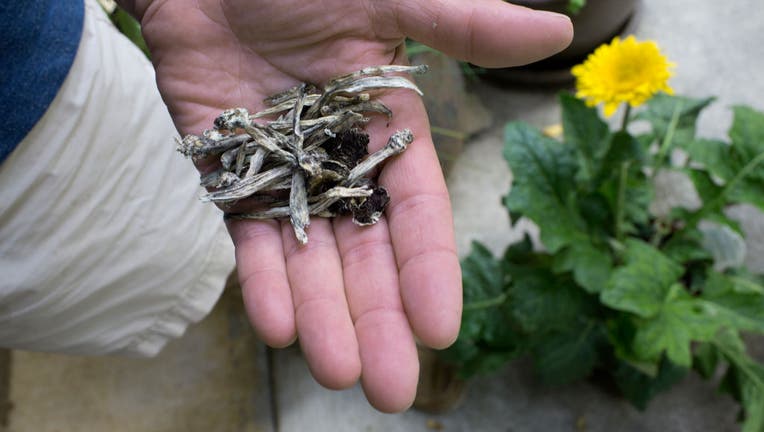Ann Arbor decriminalizes magic mushrooms, psychedelic plants

BROOKLYN, NY - JUNE 28: A man holds a handful of hallucinogenic mushrooms on June 28, 2020 in Brooklyn, New York. (Photo by Andrew Lichtenstein/Corbis via Getty Images)
ANN ARBOR, Mich. - The city of Ann Arbor has decriminalized psychedelic plants and fungi, including magic mushrooms, and police officers will no longer make them an enforcement focus.
City Council voted unanimously Sept. 21 in favor of a resolution declaring it the city’s lowest law enforcement priority, MLive.com reported. It means that authorities won't investigate and arrest anyone for planting, cultivating, buying, transporting, distributing, engaging in practices with or possessing “entheogenic plants” or plant compounds.
The resolution defines entheogenic plants as plants and fungi that contain indole amines, tryptamines and phenethylamines “that can benefit psychological and physical wellness, support and enhance religious and spiritual practices, and can reestablish human’s inalienable and direct relationship to nature.”
The move applies to ayahuasca, ibogaine, mescaline, peyote, psilocybin mushrooms and other substances with hallucinogenic properties considered illegal under state and federal law.
Additionally, the city council called upon the Washtenaw County prosecutor’s office to halt prosecution of people involved in the use of such plants and plant compounds.
A grassroots group called Decriminalize Nature Ann Arbor, or DNA2, has been lobbying city officials to take up the issue.
After some council members were apprehensive about sponsoring the group's proposal earlier this year, some ultimately decided that they were persuaded by arguments centering medical and spiritual benefits of using psychedelics, particularly for mental health treatment.
Advocates contend that non-addictive psychedelics can provide a pathway out of opioid addiction.
Council members noted that any major violation of state or federal law or any use of entheogenic plants that poses a threat to public health, safety and welfare still could result in city law enforcement involvement.
Psychedelic substances can be used to help address substance abuse issues, addiction, recidivism, trauma, post-traumatic stress, depression, anxiety and other debilitating conditions, according to the resolution.
Last year, Denver became the first U.S. city to decriminalize psychedelic mushrooms. The city was then followed by Oakland and Santa Cruz in California, which decriminalized all entheogenic plants.

